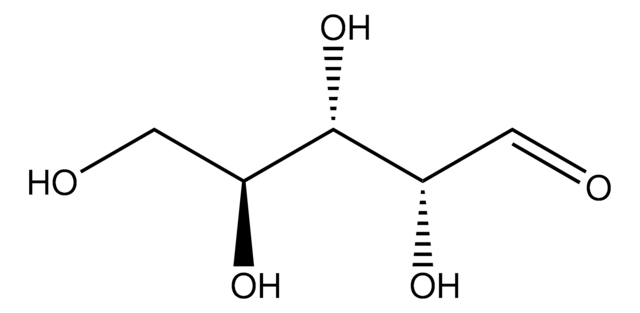63580
D-(+)-Mannose
suitable for microbiology, ≥99%
Synonyme(s) :
D-Mannopyranose
About This Item
Produits recommandés
Niveau de qualité
Pureté
≥99%
≥99.0% (sum of enantiomers, HPLC)
Forme
powder
Activité optique
[α]20/D +13.8±0.5°, 24 hr, c = 10% in H2O
Résidus de calcination
≤0.1% (as SO4)
Perte
≤0.2% loss on drying, 20 °C (HV)
Pf
133-140 °C (lit.)
Solubilité
H2O: 0.1 g/mL, clear, colorless
Traces d'anions
chloride (Cl-): ≤50 mg/kg
sulfate (SO42-): ≤50 mg/kg
Traces de cations
As: ≤0.1 mg/kg
Ca: ≤10 mg/kg
Cd: ≤5 mg/kg
Co: ≤5 mg/kg
Cr: ≤5 mg/kg
Cu: ≤5 mg/kg
Fe: ≤5 mg/kg
K: ≤50 mg/kg
Mg: ≤5 mg/kg
Mn: ≤5 mg/kg
Na: ≤50 mg/kg
Ni: ≤5 mg/kg
Pb: ≤5 mg/kg
Zn: ≤5 mg/kg
Application(s)
microbiology
Chaîne SMILES
OC[C@H]1OC(O)[C@@H](O)[C@@H](O)[C@@H]1O
InChI
1S/C6H12O6/c7-1-2-3(8)4(9)5(10)6(11)12-2/h2-11H,1H2/t2-,3-,4+,5+,6?/m1/s1
Clé InChI
WQZGKKKJIJFFOK-QTVWNMPRSA-N
Vous recherchez des produits similaires ? Visite Guide de comparaison des produits
Code de la classe de stockage
11 - Combustible Solids
Classe de danger pour l'eau (WGK)
WGK 1
Point d'éclair (°F)
Not applicable
Point d'éclair (°C)
Not applicable
Équipement de protection individuelle
Eyeshields, Gloves, type N95 (US)
Faites votre choix parmi les versions les plus récentes :
Déjà en possession de ce produit ?
Retrouvez la documentation relative aux produits que vous avez récemment achetés dans la Bibliothèque de documents.
Les clients ont également consulté
Protocoles
Separation of Ribose, United States Pharmacopeia (USP) Reference Standard; Xylitol, analytical standard; Mannose, United States Pharmacopeia (USP) Reference Standard
Notre équipe de scientifiques dispose d'une expérience dans tous les secteurs de la recherche, notamment en sciences de la vie, science des matériaux, synthèse chimique, chromatographie, analyse et dans de nombreux autres domaines..
Contacter notre Service technique








